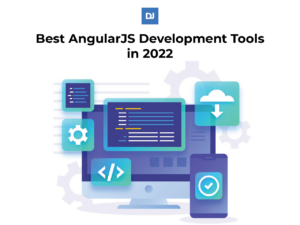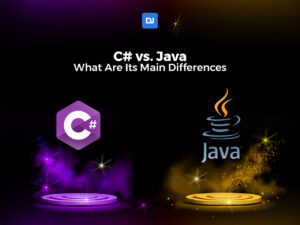PHP and Node.js are both great choices when it comes to back-end development. And like every other technology, there’s also a debate on which is best.
Node.js is an open-source, cross-platform runtime environment that delivers JavaScript to the backend and front end, while PHP is an open-source server-side script language. Currently, it is one of the top technologies ever used.
So, which one is superior? And how do you determine if PHP or Node.js is better for server-side development of your next project? Time to find out!
In this comparison article, we will look at the two of them in-depth understanding their advantages and disadvantages and comparing their:
- Performance
- Development
- Database
- Hosting
- Execution speed
- Practical application
But before any of that, let’s understand what Node.js and PHP are.
Overview: Nodejs vs. PHP Comparison
PHP, or Hypertext Preprocessor (for nerds interested in acronyms), is an open-source server-side script language that Rasmus Lerdorf developed in 1994, and it’s one of the biggest success stories. According to a survey, PHP is used by almost 78.9% of all websites using a server-side programming language known to web developers.
On the other side of this battle, Node.js is an open-source, cross-platform runtime environment that executes JavaScript code outside of a web browser. For this purpose, Node.js lets developers use JavaScript to write command line tools and for server-side scripting (running scripts server-side to produce dynamic web page content before the page is sent to the user’s browser).
Node.js represents a “JavaScript everywhere” paradigm, unifying web application development around a single programming language. Ryan Dahl developed Node.js in 2009 and it’s becoming highly popular in the development world as the way to develop scalable and fast applications.
Both operate differently in several aspects when it comes to Backend development. PHP is more focused on being flexible and easier to work with when building a web page, while Node.js aims to be a more performant alternative that provides more options to organize your project’s data. Let’s dive into a full-blown comparison of these two technologies so you can decide for yourself which to use for your projects.
Node.js vs PHP: Full Comparison for Backend Development
To know which one is best for web development in this PHP vs Node.js battle, we will compare both of them with the parameters mentioned in the introduction. Let’s get started.
1. Performance

Performance is a metric that measures how fast code is executed. It directly impacts KPIs such as seamlessness and page loads.
Certain projects and options, controlled by qualified developers, enable PHP to run faster than normal. For instance, Facebook created Hack, which was developed to be compatible with PHP. Hack aims to make your existing PHP code faster. And with PHP 8 featuring JIT, you can expect even faster speeds.
However, Node.js performance is, most of the time, better. Though performance is also largely a result of the skills and experience of the developing team, Node.js provides several advantages over PHP in terms of performance that go beyond developer skill:
Fewer Dependencies
Every request to the PHP project has to be directed to a web server, and this runs the PHP interpreter that processes the code and serves it. Node.js, on the other hand, does not require that number of dependencies. Even though you are using a server-side framework it’s lightweight and manages various aspects of the application.
No Interpreter
Node.js is more agile and smaller. This is a result of Google. The tech giant made a massive contribution to the JavaScript V8 engine’s performance. It’s worth stating that Node.js is a compiled language and PHP is an interpreted one.
Compiled code can be seamlessly executed by the PC’s CPU. This means that the executable code is specified in the CPU’s native language.
Interpreted code has to be translated from its original format during execution into CPU machine instructions by an interpreter. This translation results in a slower working of the interpreted language.
Event-Driven, Non-blocking Input/Output Stream
Most server-side languages, PHP inclusive, use a blocking model. This means when you request information from a database, the request executes and finalizes the process before transitioning to the following statement.
With Node.js, you don’t have to wait. You can create callback functions that listen to processes and execute them concurrently.
Where PHP Shines
Though Node.js projects are faster than PHP, there are certain issues. The major one is that Node.js runs on a single thread, while most web servers are multithreaded, processing requests in parallel. Writing asynchronous code has its unique challenges.
Also, unlike Python or Java, and other general-purpose programming languages, PHP was built mainly for the web. Because of this, it possesses all the required functions for working with servers, HTML, and databases, minimizing the need for JS code on your front-end.
Winner: Node.js wins the Node.js vs PHP performance battle as it offers better speed and a seamless and concurrent experience both for the developer and end-user.
2. Development

PHP is purely a back-end programming language, and this makes its application use-cases quite limited. It technically belongs to the LAMP stack, an acronym for Linux, Apache, MySQL, and PHP/Perl/Python. So to test, build, manage or even design a functional web project, you have to be proficient enough in configuring and approaching different systems along with using CSS and HTML (otherwise, you will need to hire a team to handle the other areas). The potential of having to handle unique systems complicates the learning curve immensely.
Regardless of the aforementioned issues, PHP is dynamically growing, with developers frequently coming up with new ideas to improve its functionality and features.
Node.js brings together some of the required functionality under the cover of one seamless package with zero functionality fragmentation, a clear advantage over PHP.
With Node.js you’ll be able to develop integral backend models, but you still require a reverse proxy like Nginx or Apache, an HTTP framework like Express.js, and a database such as MySQL. That said, JavaScript is a full-stack development language, completely capable of developing a web or mobile application by itself.
But there’s more to the development battle. For most web developers, coding in PHP is a quicker option as it offers easier usability. A good PHP developer can code in the language at a significantly faster speed than with Node.js. This is primarily because there’s no need to use converters or compilers. PHP allows you to establish a connection to your SQL database without hosting restrictions or confinements. However, there’s a trade-off – PHP projects do not perform as fast as those developed with Node.js.
For Node.js the deployment of frameworks and applications seems a lot more complicated. On the flip side, it executes more smoothly and rapidly as it ensures low server workloads.
So while coding in PHP is a great option when you need a fast solution, or if you require a more complex, sustainable, and efficient output, go for Node.js.
Winner: Most experienced developers would say it’s a tie. Node.js’s package management system (NPM) is a plus, but when compared to PHP their attributes are quite similar.
3. Database

PHP is usually used in collaboration with relational and traditional databases such as MariaDB, PostgreSQL, and MySQL. While you can use NoSQL database systems with PHP, these options aren’t very popular, and the processing time is both strenuous and extremely time-consuming.
Node.js, on the other hand, works seamlessly and perfectly with:
- SQL databases
- NoSQL databases such as CouchDB and MongoDB
- Graph database systems like Neo4j
Plus, the NPM packages for nearly all these databases can be found on the npm registry.
MySQL database systems are particularly susceptible to cross-site scripting (XSS), SQL injection attacks, and much more. So since PHP is typically used in collaboration with MySQL, projects you execute with the language may be vulnerable to such issues.
On the flip side, Node.js works perfectly fine with NoSQL. Being a newer concept, their design is built to make them inherently resistant to injection attacks and other such problems.
That said, PHP permits connection to nearly all database management systems such as mSQL, SQLite, etc. PHP can also be used with Redis, MongoDB, ElasticSearch, and other non-relational databases. So web developers aren’t restricted to using a specific database and have the choice of choosing the best one for the project, considering all necessary factors.
Winner: Node.js. If you intend to develop a scalable web project that consistently and seamlessly pulls data from relational, conventional, or NoSQL databases, Node.js is what you want to use.
If you want access to more database management systems options, PHP is the one to use. However, this implies a more tedious process if you decide to opt for non-relational and NoSQL databases.
4. Hosting

The hosting metric in this Node.js vs PHP comparison measures the range of compatibility the particular technology shares with or provides for different hosting service options. This is primarily because the number of available alternatives directly affects the hosting expenses. The security and speed of the web app have to also be considered when picking a host.
For Node.js, you have a range of alternatives provided that help the technology perform competitively. The organization that maintains Node.js (Joyent) provides a SmartOS system, which is excellent for performance enhancement, ease of deployment, and debugging. Also, with Nodejitsu and Heroku, it is seamless to use Node.js for a Platform-as-a-Service project.
PHP, on the other hand, is indirectly and directly powering nearly 80% of the web. Because of its insane reach, the technology is designed for compatibility with every major hosting service provider. Its LAMP stack also enables it to satisfy the needs of numerous servers. That said, the LAMP stack isn’t recommended as the most secure hosting tech stack.
Winner: PHP possesses broad compatibility with hosting service providers, but Node.js offers the same. So if you aren’t too bothered about security, you can choose either one for your web development project. There’s no major difference that’ll negatively affect your project.
5. Practical Application

Node.js is typically applied in a couple of places, such as multithreaded apps, web applications, browsers, and game servers. The technology is exceptionally great for creating dynamic one-page applications that work in a real-time, data-intensive manner, inclusive of distributed sessions across numerous devices.
Examples of these types of applications include streaming services (Netflix), instant messengers (Slack), online education (Coursera), social networks (Twitter), fintech apps (PayPal), project management tools (Trello and Asana), gaming apps, live chats, and data-intensive IoT devices and apps, etc.
PHP, on the other hand, is generally used for web-based projects. And since it is built as a completely backend-focused language, it can be seamlessly integrated with centralized servers, databases, and HTML. It is also the best pick for LAMP stack projects such as Apache, MySQL, and Linux.
PHP is often used when you deal with CMS like Joomla or WordPress, which enable you to have your web project setup very quickly. PHP is also practically applied for building eCommerce marketplaces, effective websites, email marketing platforms, and business or personal blogs.
Some of the most notable PHP projects include MailChimp, Wikipedia, Yahoo, Tumblr, and Flickr, and they showcase the powerful results that can be achieved with a mix of PHP and a centralized server.
So there’s no winner here as their practical applications differ and are dependent on what you intend to develop.
6. Execution Speed and Request Handling

As we’ve already mentioned in this comparison, these technologies adhere to varying concepts when handling requests.
PHP features asynchronous and slower code execution procedures. This means that all modules or functions are processed in the code specified order. If a particular query isn’t executed, the subsequent one won’t get started until the previous one is finished.
- PHP sends a request to the computer’s file system.
- It waits until the file system opens and reads the request.
- It sends the content to the client.
- Processes the next code line or request.
Due to the V8 engine, asynchronous execution, and real-time server interaction, Node.js offers a better execution speed and certainly outperforms PHP.
- Node.js sends a request to the computer’s file system.
- Works on the subsequent requests without waiting for the other one to finish.
- When the requested file has been opened and read by the file system, the server sends the content to the client.
This is what makes the execution speed of Node.js faster than that of PHP, as the latter offers a slower loading process.
Winner: Node.js as it cuts out the wait downtime and supplies real-time data effectively and efficiently, enabling the use of Node.js for load-intensive projects.
NodeJS vs PHP: Comparison Table
| Node.js | PHP | Winner | |
| Performance | Compiled Language | Interpreted Language | Node.js |
| Development | One single package with functionality. Uses JavaScript, which can be a full-stack language. | Can integrate with a multitude of systems. Faster to code in. | Tie |
| Database | SQL NoSQL Graph | SQL NoSQL (hard to integrate) | Node.js |
| Hosting | SmartOS Nodejitsu Heroku | Compatible with most providers Can be integrated into the LAMP tech stack | PHP |
| Practical Application | Streaming Services Instant Messengers Online Education Social Networks Fintech Apps Project Management Tools Gaming Apps Live Chats | Can be integrated with popular CMSs like WordPress or Joomla eCommerce Marketplaces Websites Marketing Platforms Blogs | Project Dependent |
| Execution Speed | Concurrent Processes | Sequential Processes | Node.js |
NodeJS vs PHP: FAQ
1. What are Node.js’ advantages and disadvantages?
Node.js Advantages
- Can process multiple functions and events in parallel.
- It is great for building any custom solution.
- It uses JavaScript, so a single language is used throughout the whole application, including the backend and front-end, making code operations very convenient.
- Due to containerization or microservices, architecture scalability can be seamlessly achieved.
- Its service calls are lighter than PHP calls.
- Permits the establishment of a real-time client-server connection.
- It provides the ease of working with JSON.
Node.js Disadvantages
- It is relatively new on the scene, so there are fewer support resources and a much smaller community.
- Content Management Systems do not provide support for it.
- It isn’t suitable for managing big files.
- It is quite ineffective with web applications that render sophisticated graphics and cause a high CPU workload.
2. What are PHP’s advantages and disadvantages?
Advantages of PHP
- Works on nearly all servers and platforms.
- Supports countless CMSs, libraries, and frameworks.
- It is easy to configure the development environment and process.
- You don’t need a virtual server with SSH access to run PHP, unlike with Node.js.
- One of the most sustainable, well-elaborated, and popular backend languages, with 80% of websites being built with PHP.
- WordPress, the world’s most used CMS, uses PHP.
- There’s a strong community of web developers who contribute to the growth of the language, auxiliary software, and training materials.
- It is very easy to learn and quick to code.
- It requires fewer code lines and has a neat code syntax.
- It is supported by many internet hosting service providers.
Disadvantages of PHP
- Incapable of handling a huge number of applications.
- It offers slower operations than Node.js because it processes line by line, executing the following function only after the previous one (but there are solutions as mentioned in this piece to manage the issue and get the best PHP performance).
- PHP is web-oriented, and it works only at the backend of your website.
- It is imperfect for debugging. This is even with in-built error highlighting tools. PHP lacks efficiency when it relates to discovering, filtering, and fixing code errors.
3. When should I use Node.js?
The right time to use Node.js is when your project requires:
- Development Efficiency: If you are developing a dynamic one-page application, you may be using ExpressJS, AngularJS, or MongoDB. Node.js is usually used in combination with this stack for seamless development and top-notch performance.
- Consistent Callback from Servers and High Speed: Web applications built using Node.js typically perform better when consistently sending requests to a server. The asynchronous architecture of Node.js enables non-blocking execution which is perfect for every project that requires speed.
- Real-time Data: Because the data-transmission speed from the server to the client-side is top-notch, this technology is great for web projects that necessitate real-time data functionality. Brands like Medium, LinkedIn, and Netflix have used Node.js for quite some time. Common to all 3 is the need for consistent and fast connections, real-time data, and ease of development.
4. When should I use PHP?
PHP should be your go-to technology for your stack if your project requires the following features:
- No Scaling Requirements and a Centralized Server: If your project requires that you allocate a particular centralized server to your web application that isn’t scaled across many servers, then PHP is the right language for your tech stack. You can also use it alongside MySQL, Apache, and Linux.
- Portability: Though PHP focuses on the number of servers you can efficiently connect with, the technology provides you with amazing portability among servers. This means you can easily move your web application to any server that has IIS, Apache, and any other database support features. Also, if you use it with Content Management Systems such as Drupal, Joomla, or WordPress, you can have your website ready to go in no time.
Final Decision: Node.js or PHP?
It’s impossible to pick one between Node.js vs PHP. Each has its advantages and disadvantages, so it’s not feasible for me or anyone to state a final verdict on the technology that outperforms the other. But what you do need to decide on is the one that is the best fit for your project.
To do so, simply pen down your product specifications and compare how Node.js and PHP will work for it. Then choose the one that will execute your project optimally. Plus, you have to take into account the developers you’re working with. If they are better at using PHP, you may want to opt for it. Or if Node.js, then go for it. Or if you need to hire a new developer to join your team, count on us. We can get you the right one to integrate within your existing team.






